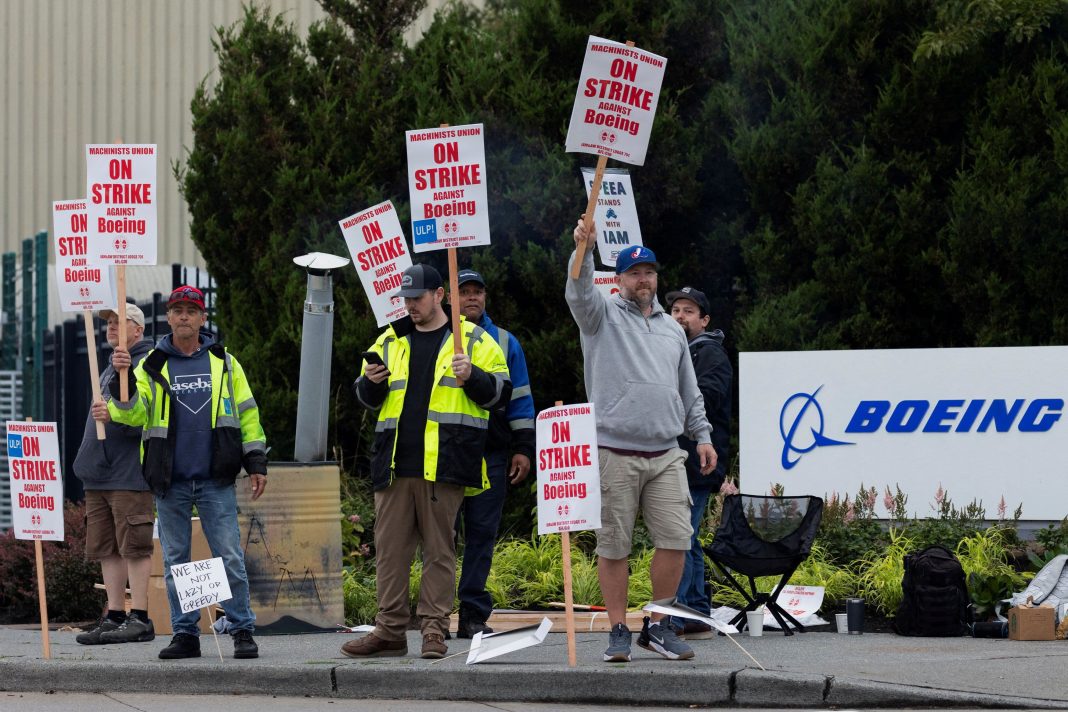In the heart of Renton, Washington, a pivotal moment in labor relations is unfolding as Boeing machinists have embarked on a strike that has already entered its second week. The ongoing work stoppage, initiated on September 13, 2024, has seen more than 30,000 workers walk off the job after a staggering 96% voted in favor of the strike. Their demands stem from a desire for better wages and improved working conditions amidst the backdrop of a company struggling under the weight of significant debt and a tarnished reputation.
This strike is not merely a confrontation between labor and management; it is a reflection of the broader economic challenges faced by workers in a region where the cost of living has soared. The median home price in Washington state has skyrocketed by 142% over the past decade, reaching $613,000 in 2023. In contrast, the national average increase over the same period was approximately 55%. For many machinists, the reality of affording a home in such an environment is becoming increasingly daunting. Jake Meyer, a Boeing mechanic, encapsulated this struggle, stating, “We can’t afford [to own] a home.” He, like many of his colleagues, is resorting to side jobs—driving for food delivery or taking on furniture moving gigs—to make ends meet during the strike.
Financially, the stakes are high for Boeing. The company is grappling with around $60 billion in debt and has already incurred losses of approximately $8 billion this year alone, exacerbated by manufacturing crises, including a near-catastrophic incident involving the 737 Max earlier in 2024. Analysts estimate that the ongoing strike is costing Boeing around $50 million each day, a figure that could escalate if the work stoppage prolongs. This financial pressure has prompted credit ratings agencies to warn of potential downgrades, which would further increase Boeing’s borrowing costs.
The motivations behind the strike are rooted in a longing for fair compensation. Boeing’s last proposal included a 25% wage increase over four years, which, while significant, fell short of the nearly 40% increase sought by union members. The International Association of Machinists and Aerospace Workers District 751, which represents the machinists, has emphasized the need for annual bonuses and the restoration of pensions lost over a decade ago. The union’s commitment to its workforce is palpable; as union members prepared for what could be a protracted strike, they organized support for their fellow workers, providing food and transportation to ensure their needs were met on the picket lines.
The strike comes at a time when Boeing’s new CEO, Kelly Ortberg, is attempting to steer the company back to stability after a series of manufacturing setbacks. Ortberg, who has been in the role for only six weeks, announced temporary furloughs for tens of thousands of employees, including management, in an attempt to cut costs. Despite these challenging circumstances, Ortberg expressed a commitment to reaching an agreement that acknowledges the hard work of employees and ends the strike.
The broader implications of this labor action resonate beyond Boeing’s walls. The strike is part of a larger wave of labor movements that have swept across various industries, including entertainment, automotive, and transportation, where workers have successfully negotiated better wages and conditions. This trend is fueled by a tight labor market that has made skilled labor increasingly difficult to attract and retain. Bank of America analyst Ron Epstein notes, “You’re in an environment where skilled, technical labor is hard to get right now, particularly in aerospace and defense.” This sentiment is echoed by many in the industry, highlighting that offering enhanced benefits, such as pensions, could serve as a competitive advantage in attracting talent.
As negotiations between Boeing and the union continue, there is a palpable sense of urgency. Transportation Secretary Pete Buttigieg has urged both parties to reach a resolution, emphasizing the need for an agreement that serves both the workers and the company. The outcome of this strike will not only impact the future of Boeing and its workforce but will also set a precedent for labor relations across the nation in an era where workers are increasingly standing up for their rights and seeking fair compensation in the face of rising living costs.
In summary, the Boeing machinists’ strike is a complex interplay of economic realities, labor rights, and corporate responsibility. As the situation evolves, it serves as a critical reminder of the importance of fair labor practices in an ever-changing economic landscape. The resolve demonstrated by the machinists, coupled with the financial pressures facing Boeing, will undoubtedly shape the company’s future and potentially redefine labor relations in the aerospace industry.

